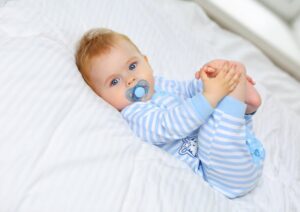 A pacifier can be a helpful tool for a parent whose baby is having trouble trying to self-soothe. Whether it’s most commonly used at nighttime while they’re asleep or as a way to minimize fussiness, they’re often viewed as a “lifesaver,” especially for tired adults. Prolonged use, though, can lead to serious issues related to baby tooth development. Fortunately, these can be avoided if appropriate steps are taken. Discover what kind of problems can occur and what you can do to prevent further harm to your child’s growing smile.
A pacifier can be a helpful tool for a parent whose baby is having trouble trying to self-soothe. Whether it’s most commonly used at nighttime while they’re asleep or as a way to minimize fussiness, they’re often viewed as a “lifesaver,” especially for tired adults. Prolonged use, though, can lead to serious issues related to baby tooth development. Fortunately, these can be avoided if appropriate steps are taken. Discover what kind of problems can occur and what you can do to prevent further harm to your child’s growing smile.
How Can Pacifiers Negatively Affect a Child’s Baby Teeth?
The American Academy of Pediatric Dentistry recommends that parents stop using pacifiers once their child reaches the age of one. The reason is that continued use affects their bite and tooth development.
While it might seem unnecessary to be concerned about baby teeth, especially since they eventually fall out, they are crucial to the future eruption, alignment, and health of permanent, adult teeth.
When a pacifier is used for too long, it can:
- Cause a Misaligned Bite: Pacifiers are known for causing crossbites, open bites, and other similar bite problems. They can also change the shape of the roof of the mouth.
- Increase the Risk of Cavities and Gum Recession: Although not as common, pacifiers can increase the risk of gum recession, gum loss, and cavities if they are dipped in sugary substances (i.e., fruit juice, soda, etc.).
- Cause Front Teeth to Protrude: When your baby’s front teeth erupt, they may start to stick out if they continue to use a pacifier. This can make it harder for them to close their mouth, resulting in speech issues later on as well as an increased risk of dental injury.
How to Help Break the Habit & Prevent Future Harm
Learning how to help your child break this habit takes time and patience, as it’s not something that usually happens overnight. Instead, their pediatric dentist can be an ally in identifying helpful ways to stop the usage and mitigate potential oral health problems in the future.
Some helpful tips to consider when trying to keep your little one from reaching for the pacifier include:
- Eliminate the number of pacifiers inside your home, car, and purse. Should one go missing, explain that it will not be replaced.
- Use encouraging words to help your child feel good about their decision not to use a pacifier to self-soothe.
- Offer an alternative to the pacifier, such as a stuffed animal or blanket, should they need something to help them through a difficult time.
- Try to identify the reason for the pacifier use and take steps to stop it. If you notice your child wants one when they become anxious or scared, try to determine what is causing these feelings.
The saying, “Too much of a good thing,” certainly pertains to pacifiers. Although beneficial and acceptable to use when your child is an infant, be ready to work together with your child’s pediatric dentist to stop the habit so that their smile continues to grow and develop correctly as the years pass.
About the Authors
Dr. Sage Yoo and Dr. Justin Chan are board-certified pediatric dentists and fathers who enjoy treating young patients and instilling good oral hygiene habits from a young age. In addition, they work together with parents to ensure certain non-nutritive practices do not negatively impact their little one’s smile. When a child comes in still using a pacifier beyond the infancy stage, we can offer helpful tips to cease this habit and avoid further harm to their baby teeth. Call (972) 987-0787 or visit our website to learn more.
